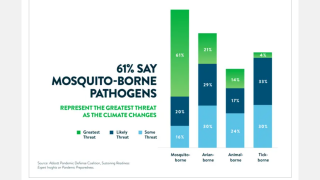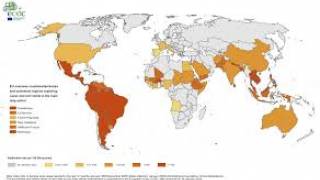Zika-Infected Children Display Neuro-Developmental Differences

Children who are exposed to the Zika virus while in their mother's womb but who are not subsequently diagnosed with Zika-related birth defects and congenital Zika syndrome (CZS) may still display differences in some aspects of cognitive development, mood and mobility compared to unexposed children, reports a study published in Pediatric Research.
It has not been clear how children exposed to the Zika virus in the womb during the 2015–2017 epidemic but who did not develop CZS, and serious neurological complications will develop as they get older.
These findings, published on November 30, 2022, suggest that Zika-exposed children may need additional support and monitoring as they age.
"There are still many unanswered questions about the long-term impacts of Zika on children exposed in utero," says Sarah Mulkey, M.D., Ph.D., a prenatal-neonatal neurologist in the Prenatal Pediatrics Institute at Children's National Hospital and the study's first author, in a related press release.
"These findings are another piece of the puzzle that provides insight into the long-term neurodevelopment of children with prenatal Zika virus exposure."
"Further evaluation is needed as these children get older."
Dr. Mulkey and colleagues examined the neurodevelopment of 55 children aged 3-5 years exposed to Zika in the womb in Sabanalarga, Colombia, and compared them to 70 control children aged 4-5 years who had not been exposed to Zika.
Any child born in Colombia during ZIKV endemicity could be ZIKV exposed, so they included only controls with older birth dates.
Health professionals tested the children's motor skills (such as manual dexterity, aiming and catching, and balance) and readiness for school (including knowledge of colors, letters, numbers, and shapes).
Parents completed three questionnaires providing information about their child's cognitive function (such as memory and emotional control), behavioral and physical conditions (such as responsibility and mobility), and parenting experience (including whether they felt distressed).
Parents of Zika-exposed children reported significantly lower levels of mobility and responsibility than control children, although differences in cognitive function scores were insignificant.
Additionally, parents of 6 (11%) Zika-exposed children reported mood problems compared to 1 (1%) of control children, and Zika-exposed parents were significantly more likely to report parental distress.
Professional testing revealed no significant differences in the Zika-exposed children's manual dexterity, such as their ability to catch an object or post a coin through a slot, compared to the control children.
Both Zika-exposed and control children also scored lowly on readiness for school.
The authors highlight that parental responses may have been influenced by the Zika-exposed children's parents' perceptions or increased worry about their child's development.
The age may have also caused some differences in results – and therefore developmental – differences between the groups of children.
The study authors conclude that while these Zika-exposed children are making progress as they develop, they may need additional support as they prepare to start school.
The study was supported by the Thrasher Research Fund. S.B.M. has additional funding from the Eunice Kennedy Shriver National Institute of Child Health & Human Development of the National Institutes of Health and a contract with the U.S. CDC.
Children's National Hospital, based in Washington, D.C., was established in 1870 to help every child grow stronger. Today, it is the No. 5 children's hospital in the nation. In addition, it is ranked No. 1 for newborn care for the sixth straight year.
As of November 30, 2022, the U.S. FDA has not approved a Zike-preventive vaccine. However, several vaccine candidates are conducting clinical trials.
ZikaNews publishes fact-checked, research-based news manually curated for mobile readers.
Our Trust Standards: Medical Advisory Committee























